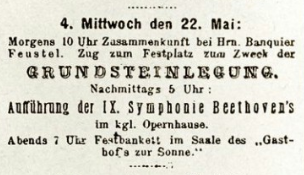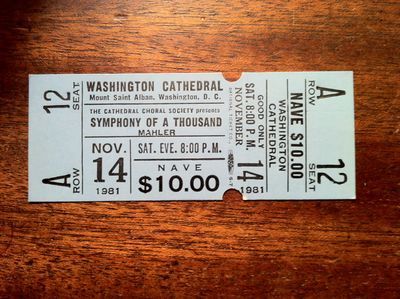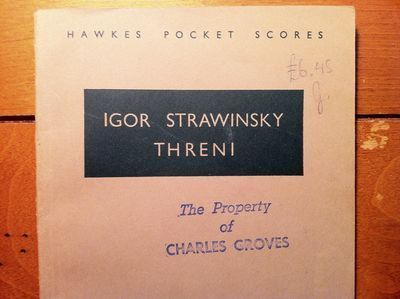Alex Ross's Blog, page 172
May 13, 2013
Let there be Steve
May 9, 2013
Wide-eyed kid
May 8, 2013
Ninth anniversary issue
Miscellany: Wagner in Oman, etc.
May 6, 2013
American Spring
Spring for Music begins tonight with a performance by the Baltimore Symphony: Marin Alsop conducting John Adams, Jennifer Higdon, and Prokofiev. The following night, the Albany Symphony revives Morton Gould's Third Symphony, and after that comes the Buffalo Philharmonic, with more than fifteen hundred Buffalonians in tow. The most ambitious of the week's programs will be the Detroit Symphony's survey of the four numbered symphonies of Charles Ives. In the video above, Leonard Slatkin, Detroit's music director, unpacks the layers of Ives's phenomenal Fourth, which, as it happens, the New York Philharmonic just played the other week. As before, all tickets for Spring for Music events top out at $25.
May 4, 2013
Amplification
The Minnesota Orchestra, whose musicians have been locked out since the beginning of the season, is veering toward catastrophe. A number of players have departed for other ensembles; the orchestra's use of state funds has raised serious questions and is under review; powerful board members have created a fearful atmosphere; and, as Graydon Royce reports, Osmo Vänskä, Minnesota's brilliant music director, is threatening to resign if the situation is not resolved soon. In his latest piece, Royce alludes to a column I wrote in 2010, in which I said, "For the duration of the evening of March 1st, the Minnesota Orchestra sounded, to my ears, like the greatest orchestra in the world." The idea was not to issue a hard-and-fast superlative but to undercut the entire business of ranking orchestras. Still, I stand by the statement, at least as far as the musicians themselves are concerned. As for the board and the management, I am tempted to apply a superlative of a quite different kind. I'll simply say this: do the board and management actually wish to destroy the Minnesota Orchestra? So far, their actions seem to be moving steadily toward that end.
April 28, 2013
Beethoven listens

In Mixed Opinions and Maxims, Nietzsche pictures how Beethoven might have reacted to contemporary performances of his music. He is, of course, talking about Beethoven circa 1878, the Beethoven of Wagner and Hans von Bülow, but his remarks seem no less relevant to the Beethoven of today:
We honor the great artists of the past less by the barren awe that leaves every word, every note lying where it was placed than by active efforts at helping them come back to life again and again. — To be sure: if we were to imagine Beethoven suddenly coming back to life and being confronted by one of his works resounding with the most modern animation and the refinement of nerves that serve the fame of our masters of execution: he would probably remain for a long time silent, uncertain whether he should raise his hand to curse or to praise, but perhaps finally say: "Well, well! That is neither I nor not-I, but some third thing — yet it seems to me right enough, even if it is not exactly right. But you might want to watch what you are doing, because you are in any case the ones who have to listen to it — and the living are right, as our Schiller says. So be right, then, and let me descend once again."
I quote from the new translation by Gary Handwerk, part of Stanford University Press's slowly unfurling edition of the complete Nietzsche in English. You can read the original German here, on the comprehensive site Nietzsche Source. "Das ist weder Ich noch Nicht-Ich, sondern etwas Drittes" — every composer must have thought so more than once.
April 27, 2013
Thoughts possibly aimed at Wagner
"The author should shut his mouth when his work opens its mouth." — Nietzsche, Mixed Opinions and Maxims
Pocket Threni
I went last night to the opening of Trinity Wall Street's festival of the sacred Stravinsky — an imposing program that included Threni, Abraham and Isaac (with the great Sanford Sylvan), and The Flood. In the crowd were more than a few veteran concertgoers and musicians who were hearing Threni for the first time live; the work has been absent from New York for many years. It's immensely difficult music, and Julian Wachner's performance wasn't always immaculate, but the eerie intensity of Stravinsky's engagement with Lamentations came through. The power and warmth of Trinity Choir banished any sense that this is cold and inexpressive music. The festival continues tonight and tomorrow afternoon, with renditions of Canticum Sacrum, Requiem Canticles, Cantata, Mass, and Symphony of Psalms. The orchestra, NOVUS NY, is well stocked with excellent young free-lancers; Owen Dalby is the concertmaster, and Alex Sopp, James Austin Smith, and Alicia Lee lead the winds. The lavish program booklet contains three characteristically learned and lively essays by Matthew Guerrieri, featuring epigraphs from, respectively, Ralph Ellison, David Bowie, and Pope Pius X.
My Threni score once belonged to the conductor Charles Groves. I picked it up at Travis & Emery, the wonderful music-book store on Cecil Court in London. I go there every time I'm in the city, invariably leaving with a stack of finds that causes headaches when it comes time to pack my suitcase. Much of Travis & Emery's stock comes from musicians' estates purchased at one time or another over the years; I have scores that were formerly the property of the composers Anthony Milner and Howard Ferguson, and my bound copy of the Beethoven piano concertos belonged to the legendary horn player Alan Civil. I'm listening now to Milner's First Symphony, a toughly argued one-movement score that's worthy of occasional revival.
Previously: Marked up.
April 25, 2013
M. Proust's self-editing seminar
"Marcel Proust and Swann's Way," the Morgan Library's exhibition of Proustian notebooks, drafts, typescripts, and proofs, is in its last week, and I urge anyone with an interest in the author to see it. Mary Hawthorne wrote a lovely piece about the show for the New Yorker website, to which I have little intelligent to add. I'd like to single out, though, a wonderful detail regarding Proust's struggle to fix the famous opening sentence of Swann's Way. It's often said in writing classes that you can find a strong opening by cutting unnecessary throat-clearing pronouncements and starting with your second or third sentence. Although Proust is a risky model in the art of concision, one of his typescripts provides a case in point. It begins: "At the time of that morning, whose memory I would like to fix, I was already ill; I would be up all night and went to bed only during the day. However, the time when I would go to bed early and, with a few short interruptions, would sleep until morning, was not that far in the past, and I was still hoping that it would return." Proust, reading over his work, crosses out those sentences and writes, "For a long time, I went to bed early." He kept on fussing with the opening, as you can see from the galley proof above, but in the end he did not change his mind.
Alex Ross's Blog
- Alex Ross's profile
- 425 followers








